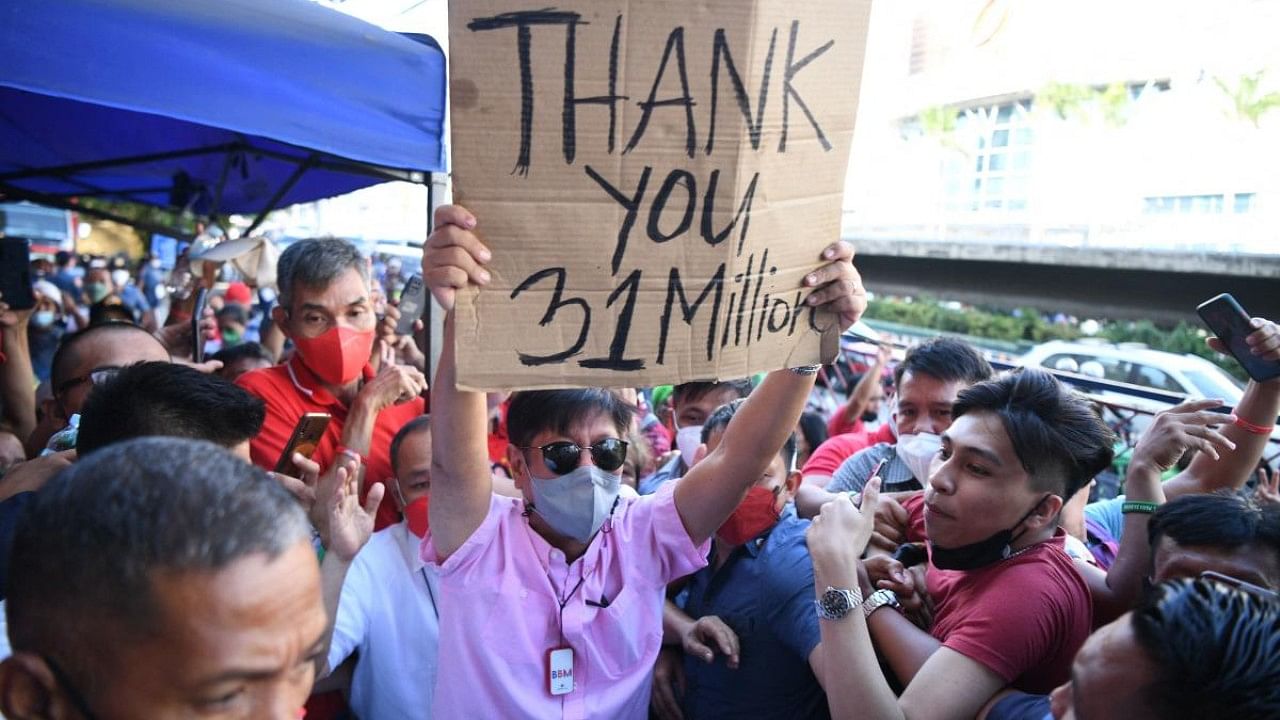
How? That's the question many around the world are asking after the Philippines voted Ferdinand Marcos Jr, the son and namesake of the country's former dictator, to the presidency with a landslide majority on Monday. The answer isn't complicated — and other democracies, including the United States, Brazil, Peru and yes, India, serve as examples of the factors that have brought Manila to this moment.
Marcos, the father, ruled with terror as his weapon; his 21-year-long reign brought to an end in 1986 only by a popular movement of millions of Filipinos. Thousands of instances of forced disappearances, torture and extrajudicial killings stained his rule. His wife Imelda — Marcos Jr's mother — came to epitomise the family's kleptocracy and gained global notoriety for her vast collection of luxury shoes. Billions of dollars that the family stole are still to be recovered. Yet 36 years after the dictator was forced to flee, his son — also called Bongbong — will now lead the country.
We shouldn't be surprised. Marcos Jr has come to power riding on a well-oiled machine of misinformation and myth-making about the past that has been tried and tested to great success in recent years in numerous democracies.
More than a century ago, philosopher George Santayana famously wrote that "those who cannot remember the past are condemned to repeat it." But what if the past is remembered only in a falsified, revisionist way?
To be sure, most modern nations are built on identities they've created for themselves that might not match with the way other countries around the world see them. That's particularly so for big powers with a history of colonisation, wars and occupation. There's a reason the West's positions on military conflicts — Ukraine is the latest example — rarely resonate with large parts of Asia and Africa. This is also true for leaders. In Britain and much of the West, Winston Churchill is valorised as a saviour whose leadership helped his country and the world defeat the Nazis. Over in India, however, Churchill is remembered for policies that led to the Bengal famine of 1943 that left 3 million people dead — collateral victims of a strategy to deny advancing Japanese troops food supplies.
But it's one thing for different nations to remember the past differently; quite another for societies to rewrite their own recorded histories. A key ingredient that can help fast-track that process? Social media.
Surveys have shown that Filipinos spend more time on social platforms than any other people. And according to findings from multiple independent experts and researchers, social media accounts supportive of Marcos Jr flooded Filipinos with misinformation in the months leading up to the vote. They claimed that the father was falsely accused of crimes he didn't commit and that the Marcos dictatorship had led to a golden age for the economy and law that the son would restore. Marcos Jr has been unapologetic about his father's regime. And the myths and lies his supporters have peddled include the idea that any wealth that the family might have stashed away outside the Philippines was intended to help fuel economic growth once the Marcos clan was back in power. That a majority of Filipinos were born after 1986 helps these efforts at spreading falsehoods.
If the recipe Marcos Jr has followed to reach the top in the Philippines sounds familiar, that's because it is.
In India, organised troll farms have helped amplify the message of Prime Minister Narendra Modi and intimidate critics on Facebook, Twitter and WhatsApp. All parties are guilty of misinformation, but independent fact-checkers with no political leanings have concluded that Modi's BJP holds a monopoly over the practice, which relies heavily on a retelling of history more favourable to those currently in power. The controversial history of the BJP's parent organisation, the RSS — such as the sympathies of its early leaders with the Nazis and their compromises with British colonialists — is sought to be supplanted with new-age myths. Perhaps the Taj Mahal, in reality built under the Mughal emperor Shah Jahan, was actually a Hindu temple? Maybe the Qutab Minar, a 14th-century tower that's one of Delhi's most iconic structures, was home to a Hindu deity too?
Over in the US, former President Donald Trump weaponised Twitter in particular to spread untruths that, augmented by supporters and bots — some of them Russian — helped power his campaign in 2016 and helped him challenge the 2020 election outcome.
To the south, in Brazil, President Jair Bolsonaro — a former army captain — came to power in 2018, defending the record of the military dictatorship that ruled Latin America's biggest nation from 1964 to 1985, almost overlapping with the Marcos regime. His son has been accused of running a bot factory that acts as a megaphone for Bolsonaro's often outlandish and false claims on social media. In 2020, Brazil's top court ordered Facebook to globally ban a network of accounts linked to Bolsonaro that were spreading lies.
And in Peru, Keiko Fujimori, the daughter of former president Alberto Fujimori — who was convicted of corruption and human rights abuses — came within a hair's breadth of taking the presidency last year. After a socialist farmer, Pedro Castillo, was declared the winner, Keiko used social media disinformation to try and challenge the outcome — much like Trump did after losing to current US President Joe Biden in 2020.
The win for Marcos Jr only underscores how vulnerable democracies are to the whitewashing of history, especially in the era of social media manipulation. Promising a return to the past is easier than actually building a future. All it needs is a viral tweet.
(Charu Sudan Kasturi is a journalist.)
Disclaimer: The views expressed above are the author's own. They do not necessarily reflect the views of DH.